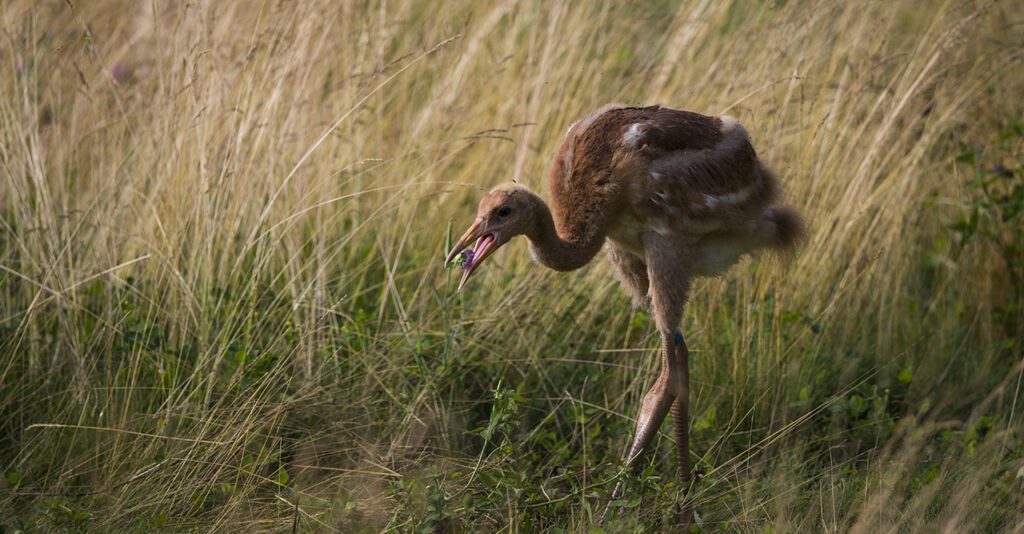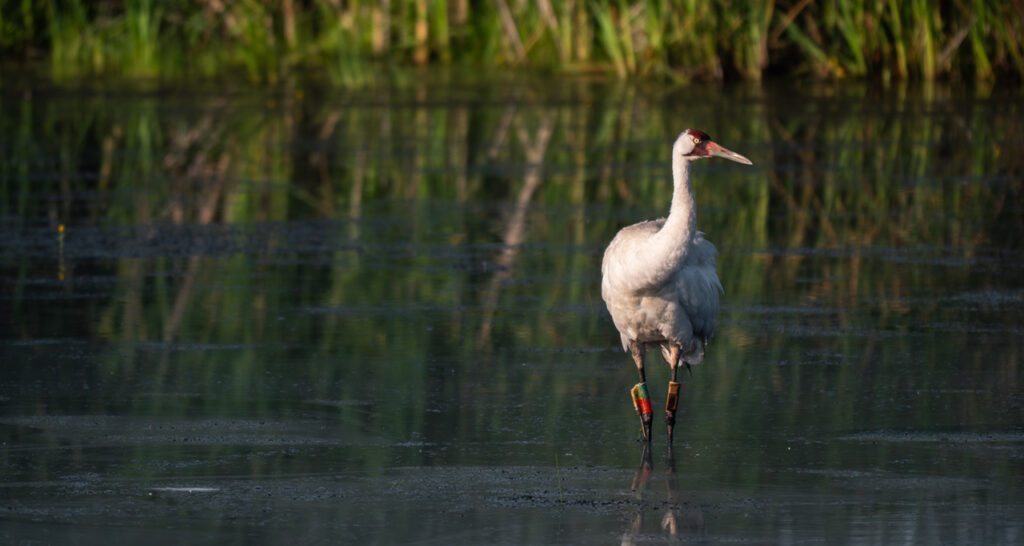International Crane Foundation researcher appointed to Wisconsin Legislative Council Study Committee on Sandhill Cranes
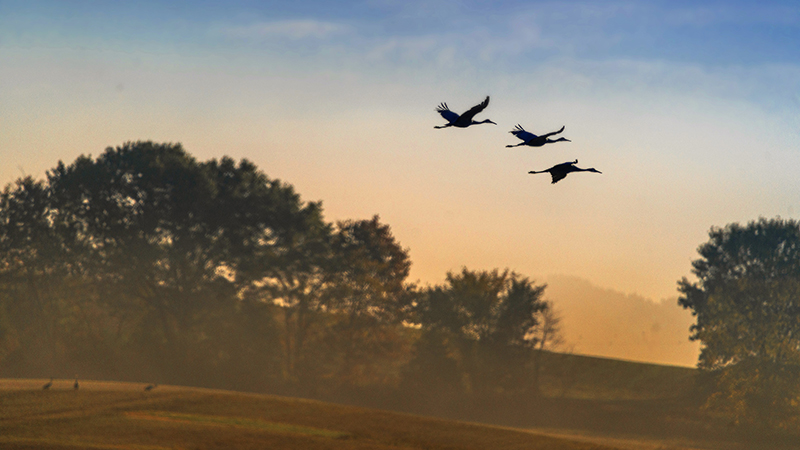
CONTACT: Ryan Michalesko, Communications & Advocacy Specialist, 608-509-6054
July 1, 2024 – The International Crane Foundation is pleased to announce Anne Lacy, Director of Eastern Flyway Programs – North America, has been appointed to the Legislative Council Study Committee on Sandhill Cranes in the Wisconsin Legislature.
The committee, which is one of five study committees this year, is charged “to review and recommend options for legislation relating to the management of Wisconsin’s Sandhill Crane population,” according to the committee scope published by the Legislative Council.
Established in 1947, the Joint Legislative Council’s primary responsibility is to establish study committees to look at major issues and problems identified by the Legislature. Study committees do most of their work in the interim of even-numbered years. Members of the public with specific knowledge regarding the study topic may nominate themselves and others to serve on the committees.
Committee members were approved Thursday with a 20-2 vote of the Wisconsin Joint Legislative Council and include representatives from the International Crane Foundation, Wisconsin Green Fire, and University of Wisconsin-Stevens Point, along with members of the farming community and hunting organizations.
“We are disappointed that fellow bird conservation organizations, including Southern Wisconsin Bird Alliance and Wisconsin Society for Ornithology, were not included,” said Beilfuss.
ICF leads research on crop damage solutions
The Study Committee on Sandhill Cranes is expected to have its first meeting in late July or early August 2024. Meetings will be open to the public and participation is encouraged.
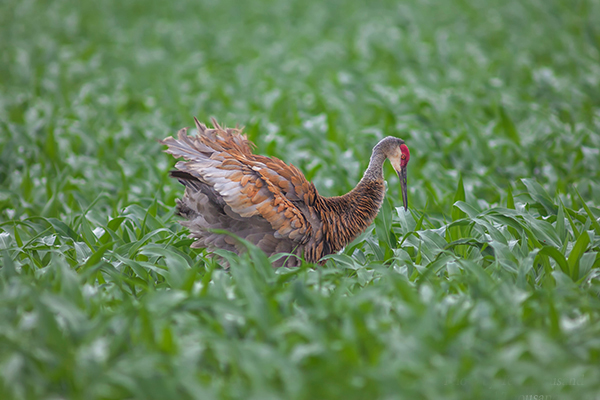
The International Crane Foundation has worked in Wisconsin’s agricultural communities for three decades to resolve the issue of crop damage by cranes. In partnership with Arkion LLC, the Foundation helped develop Avipel seed treatment, which has been available to farmers since 2006. The seed treatment is a harmless, non-toxic substance, originally derived from plants, and that is applied to corn seeds before they are planted. Cranes avoid feeding on the treated, planted seed but remain in the field to feed on worms, insects, waste grains, and other food items.
“We know this product is effective at protecting both crops and crane habitat,” said Beilfuss. “I am hopeful that the Study Committee will offer a route for legislators to join us in making real solutions like Avipel easy and affordable for Wisconsin’s farmers.”
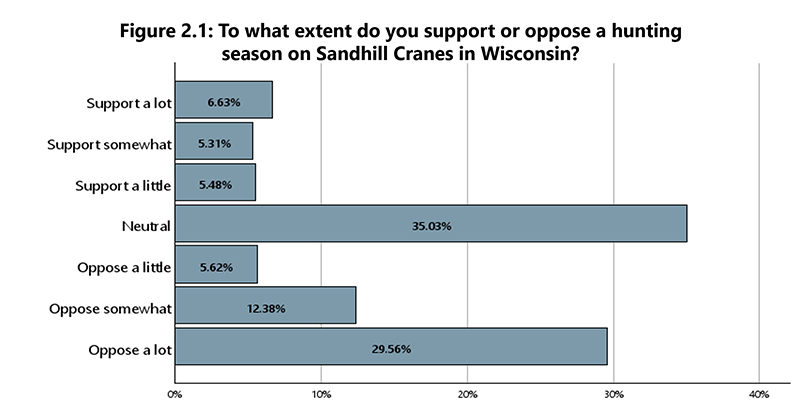
A study led by Wisconsin researchers reveals that only 17.4 percent of Wisconsin residents support a crane hunting season. The study also found that nearly half (47.6%) of Wisconsinites oppose a crane hunt, and nearly a third (29.6%) of Wisconsinites strongly oppose a crane hunt.
Hunting season is not a solution to crop damage
The Committee is to be led by Chair Rep. Paul Tittl (R-Manitowoc) and Vice Chair Sen. Romaine Quinn (R-Cameron). In 2021, Rep. Tittl sponsored a bill to authorize the hunting of Sandhill Cranes. The bill was ultimately not approved.
“Advocates for a hunting season on Sandhill Cranes have long promoted it as the solution to crop damage, but we know a hunting season is not going to help farmers,” Beilfuss said.
“We have three or more separate issues to address: crop damage by cranes, hunting cranes for recreational purposes, and crane-based tourism in Wisconsin. I hope we can look holistically at how best to support farmers and cranes,” he added.
The suggestion that the Wisconsin Department of Natural Resources (DNR) establish a hunting season for Sandhill Cranes has come up before the Wisconsin legislature several times in recent years. The most recently introduced bill set forth a $2 surcharge earmarked for the agricultural damage program. A fiscal estimate of the bill conducted by the DNR outlined that as many as 200 claims for crane-caused agriculture damage—totaling as much as $1.6 million—could be filed annually. Even with the issuance of several thousand crane hunting permits, this earmark would provide a mere fraction of the necessary support required to alleviate the cost of abatement or compensation.
Furthermore, a study led by Wisconsin researchers reveals that only 17.4 percent of Wisconsin residents support a crane hunting season, and less than five percent of Wisconsinites reported that they were very likely to participate in a crane hunt. The study also found that nearly half (47.6%) of Wisconsinites oppose a crane hunt, and nearly a third (29.6%) of Wisconsinites strongly oppose a crane hunt. The study was conducted using the University of Wisconsin Survey Center online panel WisconSays, which was scientifically developed to be representative of the state as a whole.
What You Can Do
The International Crane Foundation is working hard to implement real solutions to crop damage that will actually help farmers right now.
If you are a Wisconsin resident, please contact your legislators in the Wisconsin State Assembly and Senate! Urge them to vote no on a hunting season and instead support real options to help farmers, such as funding to offset the cost of Avipel, a known seed treatment effective at deterring crop damage. You can identify your state legislators and find their contact information here.
